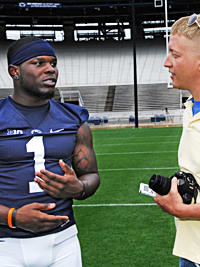Column: Pay the college athlete

Don't let the headline fool you. This isn't your normal pay-for-play argument.
In fact, it's just the opposite. But I'm still in support of paying college athletes. Well, at least some of them.
Advertisement
Lately the NCAA has been defending itself against a barrage of legal challenges while trying to maintain a shaky status quo. At the same time, the prospect of super-conference football seems more imminent than ever. Against that backdrop, another movement has developed to pay college athletes - football players, specifically. And the Johnny Football saga has only added fuel to the debate.
So here's a different take. Maybe it won't totally resolve the financial injustice between the conferences/universities, with their growing television contracts, and the student-athletes. But maybe it's a start. Please read on.
What if the conferences and universities didn't compensate every student-athlete for simply being on a roster? What if, instead, athletes were paid for their contributions to the program and the way they represented the university? That's the crux of the whole argument, isn't it? The universities make millions of dollars off the backs of their athletes, who draw thousands of fans to stadiums and to television screens each Saturday. It's time, some experts say, that the athletes get their share, too.
But when the revenue differences between schools are so substantial, it seems next to impossible for all to afford the same all-around stipend for every scholarship athlete. So let's pay only some per team, the ones who have gone above and beyond to earn it. And let the funding come from conferences, so that money can be disbursed evenly.
And let it have nothing to do with how many interceptions they make or how many baskets they score. Let them be rewarded for what they do away from the playing surface.
Take, for example, the contingent of Glenn Carson, John Urschel and Malcolm Willis, who represented the Nittany Lions at Big Ten media days in late July. The only things, Willis told me, that they received as a token for their attendance were a schedule of events and an umbrella.
"It was a great time and a great experience," Willis said. "I really didn't need anything else."
Maybe not, but he deserved more. All the other people attending media days in Chicago -- the coaches, the sports information directors, the reporters -- were being paid for their work. The only ones left out were the young men upon whom the whole event was based, the ones being badgered with question after question, dragged from one interview to the next. Those guys didn't get paid. They got an umbrella.
Even if it's a small stipend, these are the student-athletes whom the conferences should be paying, not every individual who makes the final roster. Guys like Carson, Urschel and Willis are at the forefront, selling their university to future students, selling their program to future recruits, setting the base for future income. But, financially, they get the least out of it.
According to the terms of his latest contract, Bill O'Brien receives $1 million for participating in public appearances and university-sponsored radio and television programs. It would be absurd to expect his players to receive similar compensation, but it would not be so absurd for his players -- especially team leaders like Willis, Carson and Urschel -- to get something, anything.
I proposed this idea to Willis: Instead of paying each guy on the team, compensate a select group. Pay the upperclassmen who shoulder the extra responsibility of representing their university away from the field. Compensate the stars who appear on the cover of the media guide. Give bonuses to the student-athletes who headline the All-Academic teams. Reward leaders who serve as the face of the university, like Urschel, who is literally part of the Faces of Penn State public relations campaign.
Let that full-ride athletic scholarship -- complete with tuition, room and board, paid textbooks, laundry money and the peace of mind that comes from knowing you won't be buried in student debt -- compensate for what happens between the lines.
Pay extra to the student, not the athlete.
Willis is a senior safety from Marbury, Md., and he said he was raised "the right way" by his mother. He said he works his hardest to be a "class act" for his teammates. So when I asked him about this proposal, he said, "I definitely wouldn't turn it down. But what happens, happens. Really, all we need is the love of the game. That's really enough for me."
But, he added, "We have a role to reflect upon. We have a lot of young guys looking up to us."
And maybe that's why this plan would be effective. Certainly, the head coach would never allow a suspended or academically ineligible athlete to represent the team at a conference media event. It incentivizes academic excellence, community outreach and positive university representation, as well as on-field excellence.
And if the young guys see the upperclassmen with a few extra dollars in their pocket, it might just be the start of something great.